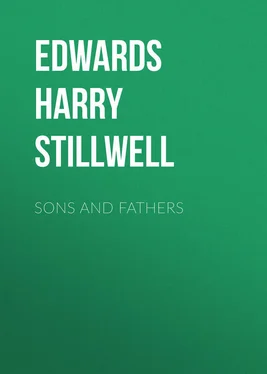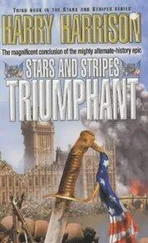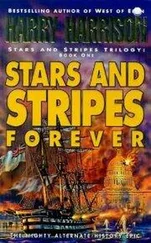Harry Edwards - Sons and Fathers
Здесь есть возможность читать онлайн «Harry Edwards - Sons and Fathers» — ознакомительный отрывок электронной книги совершенно бесплатно, а после прочтения отрывка купить полную версию. В некоторых случаях можно слушать аудио, скачать через торрент в формате fb2 и присутствует краткое содержание. Жанр: foreign_antique, foreign_prose, на английском языке. Описание произведения, (предисловие) а так же отзывы посетителей доступны на портале библиотеки ЛибКат.
- Название:Sons and Fathers
- Автор:
- Жанр:
- Год:неизвестен
- ISBN:нет данных
- Рейтинг книги:5 / 5. Голосов: 1
-
Избранное:Добавить в избранное
- Отзывы:
-
Ваша оценка:
- 100
- 1
- 2
- 3
- 4
- 5
Sons and Fathers: краткое содержание, описание и аннотация
Предлагаем к чтению аннотацию, описание, краткое содержание или предисловие (зависит от того, что написал сам автор книги «Sons and Fathers»). Если вы не нашли необходимую информацию о книге — напишите в комментариях, мы постараемся отыскать её.
Sons and Fathers — читать онлайн ознакомительный отрывок
Ниже представлен текст книги, разбитый по страницам. Система сохранения места последней прочитанной страницы, позволяет с удобством читать онлайн бесплатно книгу «Sons and Fathers», без необходимости каждый раз заново искать на чём Вы остановились. Поставьте закладку, и сможете в любой момент перейти на страницу, на которой закончили чтение.
Интервал:
Закладка:
"We are old acquaintances, Miss Montjoy," he replied with more earnestness than the occasion justified. "I knew you in Paris, in Rome, even in India – I have known you always." She blushed slightly and turned her face away as a lady appeared leading a little girl.
"Here is Mr. Morgan, Annie; you met him for a moment only, I believe."
The newcomer extended her hand languidly.
"Any one whom Norton is so enthusiastic about," she said, without warmth, "must be worth meeting a second time."
Her small eyes rested upon the visitor an instant. Stunned as he had been by large misfortunes, he felt again the unpleasant impression of their first meeting. Whether it was the manner, the tone of voice, the glance or languid hand that slipped limply from his own, or all combined, he did not know; he did not care much at that time. The young woman placed the freed hand over the mouth of the child begging for a biscuit, and without looking down said:
"Mary, get this brat a biscuit, please. She will drive me distracted." Mary stooped and the Duchess leaped into her arms, happy at once. Edward followed them with his eyes until they reached the end of the porch and Mary turned a moment to receive additional directions from the young mother. He knew, then, where he had first seen her. She was a little madonna in a roadside shrine in Sicily, distinct and different from all the madonnas of his acquaintance, in that she seemed to have stepped up direct from among the people who knelt there; a motherly little woman in touch with every home nestling in those hills. The young mother by him was watching him with curiosity.
"I have to thank you for a beautiful picture," he said.
"You are an artist, I suppose?"
"Yes; a dilletante. But the picture of a woman with her child in her arms appeals to most men; to none more than those who never knew a mother nor had a home." He stopped suddenly, the blood rushed to his face and brain, and he came near staggering. He had forgotten for the moment.
He recovered, to find the keen eyes of the woman studying him intently. Did she know, did she suspect? How this question would recur to him in all the years! He turned from her, pale and angry. Fortunately, Mary returned at this moment, the little one contentedly munching upon its biscuit. The elder Mrs. Montjoy welcomed him with her motherly way, inquiring closely into his arrangements for comfort out at Ilexhurst. Who was caring for him? Rita! Well, that was fortunate; Rita was a good cook and good housekeeper, and a good nurse. He affected a careless interest and she continued:
"Yes, Rita lived for years near here. She was a free woman and as a professional nurse accumulated quite a sum of money, and then her husband dying, John Morgan had taken her to his house to look after a young relative who had been left to his care. What has become of this young person?" she asked. "I have not heard of him for many years."
"He is still there," said Edward, briefly.
And then, as they were silent, he continued: "This woman Rita had a husband; how did they manage in old times? Was he free also? You see, since I have become a citizen your institutions have a deal of interest for me. It must have been inconvenient to be free and have someone else owning the husband."
He was not satisfied with the effort; he could not restrain an inclination to look toward the younger Mrs. Montjoy. She was leaning back in her chair, with eyes half-closed, and smiling upon him. He could have strangled her cheerfully. The elder lady's voice recalled him.
"Her husband was free also; that is, it was thought that she had bought him," and she smiled over the idea.
A slanting sunbeam came through the window; they were now in the sitting-room and Mary quickly adjusted the shade to shield her mother's face.
"Mamma is still having trouble with her eyes," she said; "we cannot afford to let her strain the sound one."
"My eyes do pain me a great deal," the elder Mrs. Montjoy said. "Did you ever have neuralgia, Mr. Morgan? Sometimes I think it is neuralgia. I must have Dr. Campbell down to look at my eyes. I am afraid – " she did not complete the sentence, but the quick sympathy of the man helped him to read her silence aright. Mary caught her breath nervously.
"Mary, take me to my room; I think I will lie down until tea. Mr. Morgan will be glad to walk some, I am sure; take him down to the mill." She gave that gentleman her hand again; a hand that seemed to him eloquent with gentleness. "Good-night, if I do not see you again," she said. "I do not go to the table now on account of the lamp." He felt a lump in his throat and an almost irresistible desire to throw himself upon her sympathy. She would understand. But the next instant the idea of such a thing filled him with horror. It would banish him forever from the portals of that proud home.
And ought he not to banish himself? He trembled over the mental question. No! His courage returned. There had been some horrible mistake! Not until the light of day shone on the indisputable fact, not until proof irresistible had said: "You are base-born! Depart!" When that hour came he would depart! He saw Mary waiting for him at the door; the young mother was still watching him, he thought. He bowed and strode from the room.
"What is it?" said the girl, quickly; "you seem excited." She was already learning to read him.
"Do I? Well, let me see; I am not accustomed to ladies' society," he said, lightly; "so much beauty and graciousness have overwhelmed me." He was outside now and the fresh breeze steadied him instantly.
There was a sun-setting before them that lent a glow to the girl's face and a new light to her eyes. He saw it there first and then in the skies. Across a gentle slope of land that came down from a mile away on the opposite side into their valley the sun had gone behind a shower. Out on one side a fiery cloud floated like a ship afire, and behind it were the lilac highlands of the sky. The scene brought with it a strange solemnity. It held the last breath of the dying day.
The man and girl stood silent for a moment, contemplating the wonderful vision. She looked into his face presently to find him sadly and intently watching her. Wondering, she led the way downhill to where a little boat lay with its bow upon the grassy sward which ran into the water. Taking one seat, she motioned him to the other.
"We have given you a Venetian water-color sunset," she said, smiling away her embarrassment, "and now for a gondola ride." Lightly and skillfully plying the paddle the little craft glided out upon the lake, and presently, poising the blade she said, gayly:
"Look down into the reflection, and then look up! Tell me, do you float upon the lake or in the cloudy regions of heaven?" He followed her directions. Then, looking steadily at her, he said, gently:
"In heaven!" She bent over the boat side until her face was concealed, letting her hand cool in the crimson water.
"Mr. Morgan," she said after awhile, looking up from under her lashes, "are you a very earnest man? I do not think I know just how to take you. I am afraid I am too matter-of-fact."
He was feverish and still weighed down by his terrible memory. "I am earnest now, whatever I may have been," he said, softly, "and believe me, Miss Montjoy, something tells me that I will never be less than earnest with you."
She did not reply at once, but looked off into the cloudlands.
"You have traveled much?" she said at length, to break the awkward silence.
"I suppose so. I have never had what I could call a home and I have moved about a great deal. Men of my acquaintance," he continued, musingly, "have been ambitious in every line; I have watched them in wonder. Most of them sacrifice what would have been my greatest pleasure to possess – mother and sister and home. I cannot understand that phase of life; I suppose I never will."
Читать дальшеИнтервал:
Закладка:
Похожие книги на «Sons and Fathers»
Представляем Вашему вниманию похожие книги на «Sons and Fathers» списком для выбора. Мы отобрали схожую по названию и смыслу литературу в надежде предоставить читателям больше вариантов отыскать новые, интересные, ещё непрочитанные произведения.
Обсуждение, отзывы о книге «Sons and Fathers» и просто собственные мнения читателей. Оставьте ваши комментарии, напишите, что Вы думаете о произведении, его смысле или главных героях. Укажите что конкретно понравилось, а что нет, и почему Вы так считаете.












